Abstract
OBJECTIVE: To review a single center's 10-year experience with liver transplantation (LTx) for the biliary atresia-polysplenia syndrome (BA-PS) and to define surgical and clinical guidelines for its management. SUMMARY BACKGROUND DATA: BA is the most common indication for pediatric liver transplantation (LTx) and is associated with PS in 12% of cases. Only a few studies of LTx for BA-PS have been reported, and the optimal management of BA-PS patients undergoing LTx has yet to be determined. METHODS: From July 1985 to September 1995, 166 liver transplants were performed in 130 patients with BA and were included in the study. The malformations most commonly associated with BA-PS, surgical techniques used to overcome these anomalies, and surgical pitfalls that could have contributed to the outcome were characterized. Actuarial 10-year patient and graft survival for patients undergoing LTx for BA-PS were calculated and compared to those with isolated BA. RESULTS: Ten patients (7.8%) with BA had associated PS. An additional patient with PS without BA was included in the study. The diagnosis of PS was unknown before the transplantation in 72% of cases. Thirteen liver transplants were performed in these 11 patients. Modifications of the usual surgical technique were used to overcome the complex anatomy encountered. There was no association between the type of anomaly and the outcome, nor were there any significant differences in patient survival (72% vs. 73.5%, p = 0.79) or graft survival (56.4% vs. 54.6%, p = 0.54). CONCLUSIONS: The association of BA with various anomalies should be considered a spectrum that may vary widely from patient to patient. The finding of two or more of these malformations in a patient awaiting transplantation should lead the surgeon to look systematically for other associated anomalies. With some special surgical considerations, the outcome in BA-PS patients should not differ from those with isolated BA.
Full text
PDF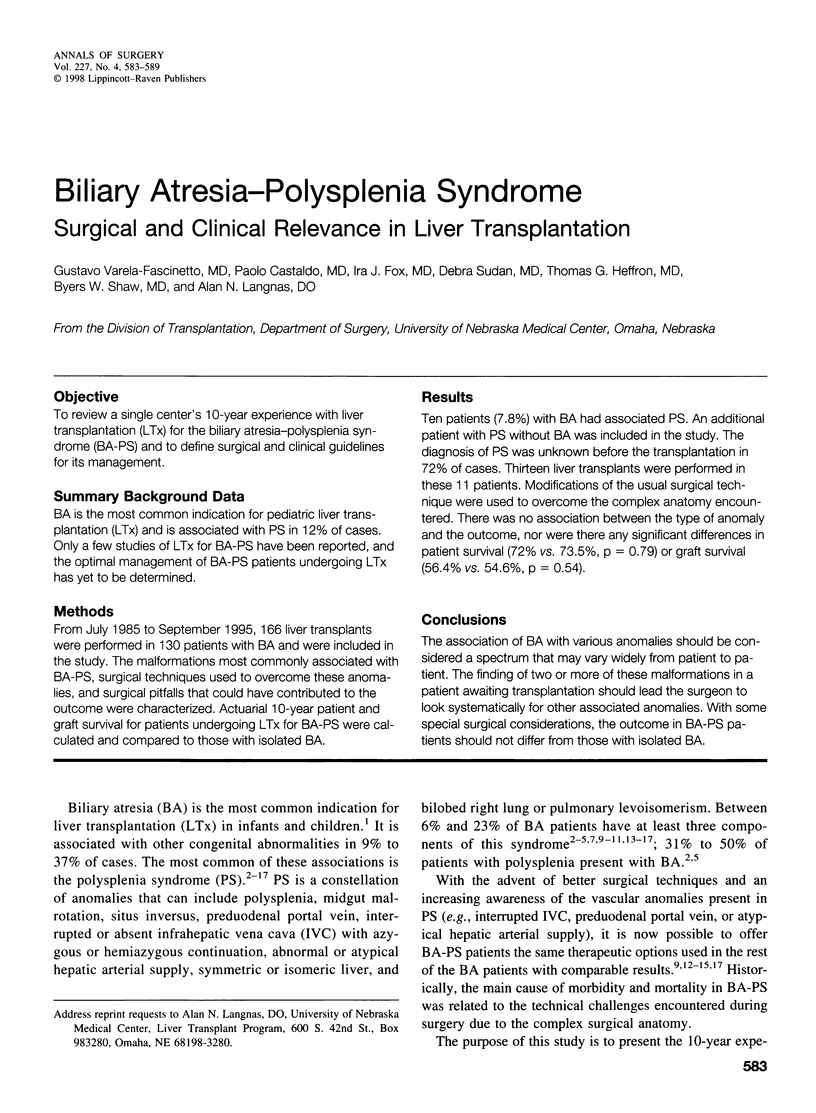
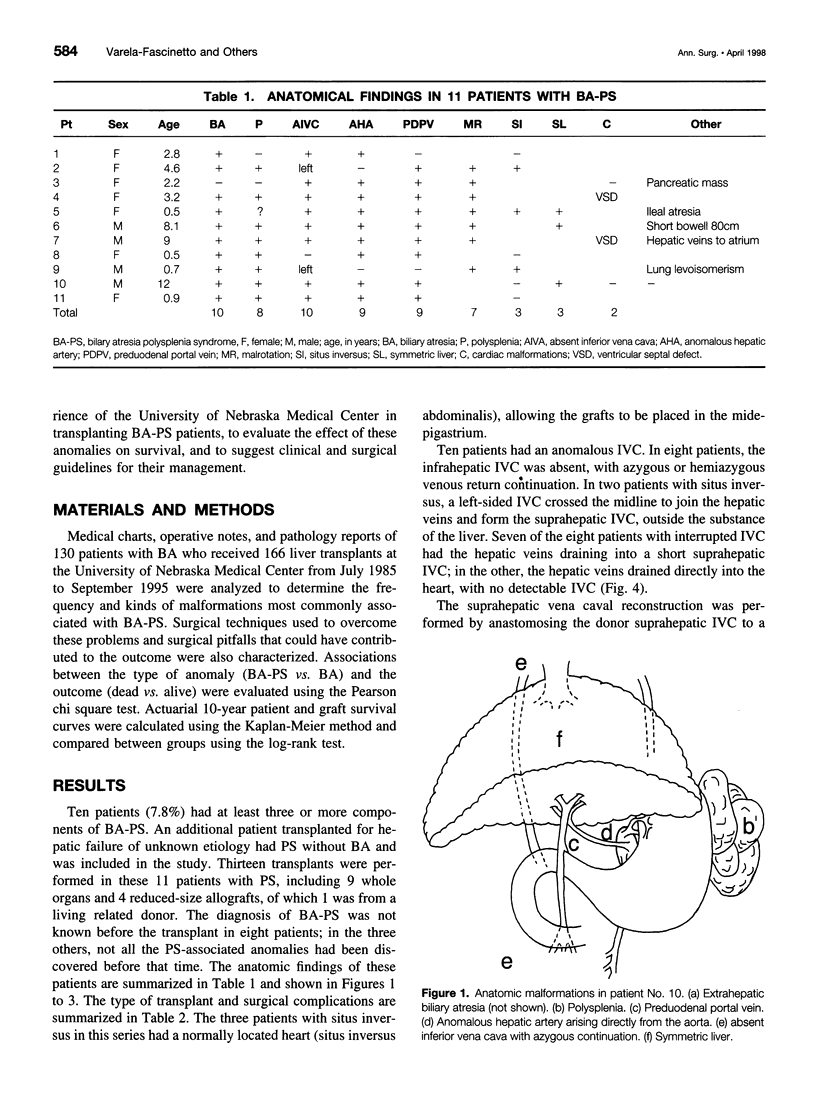
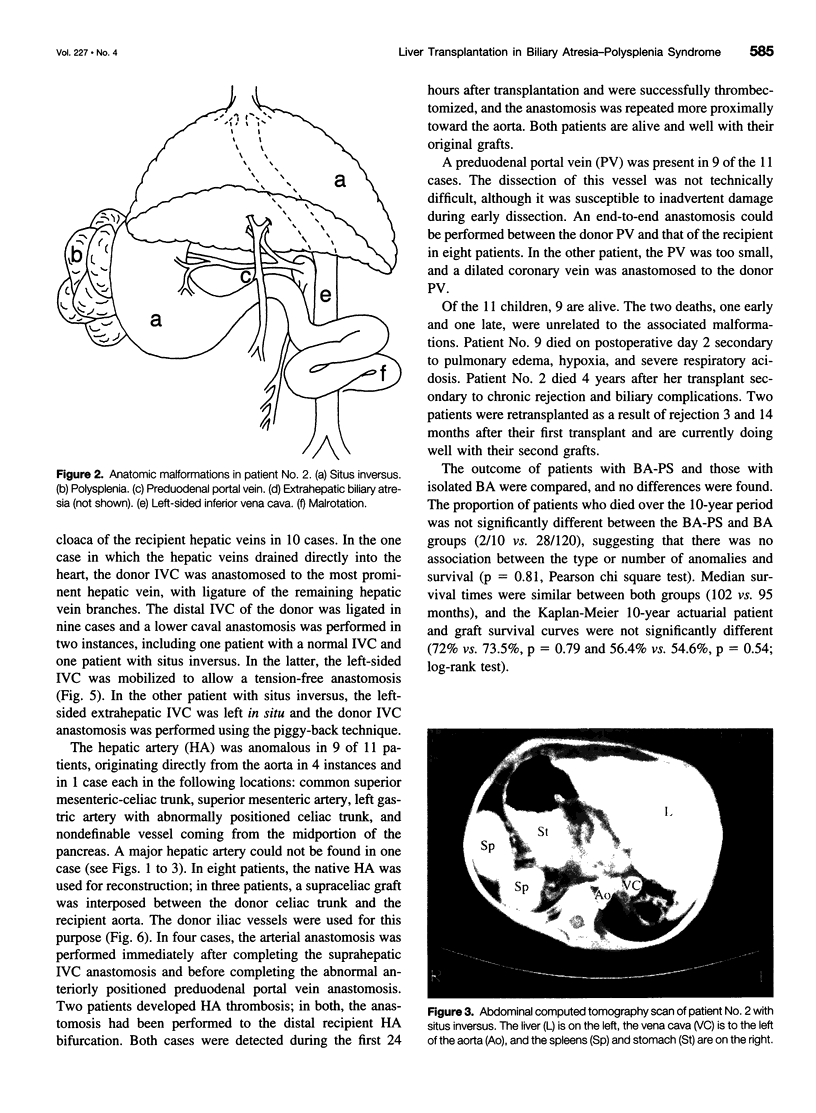
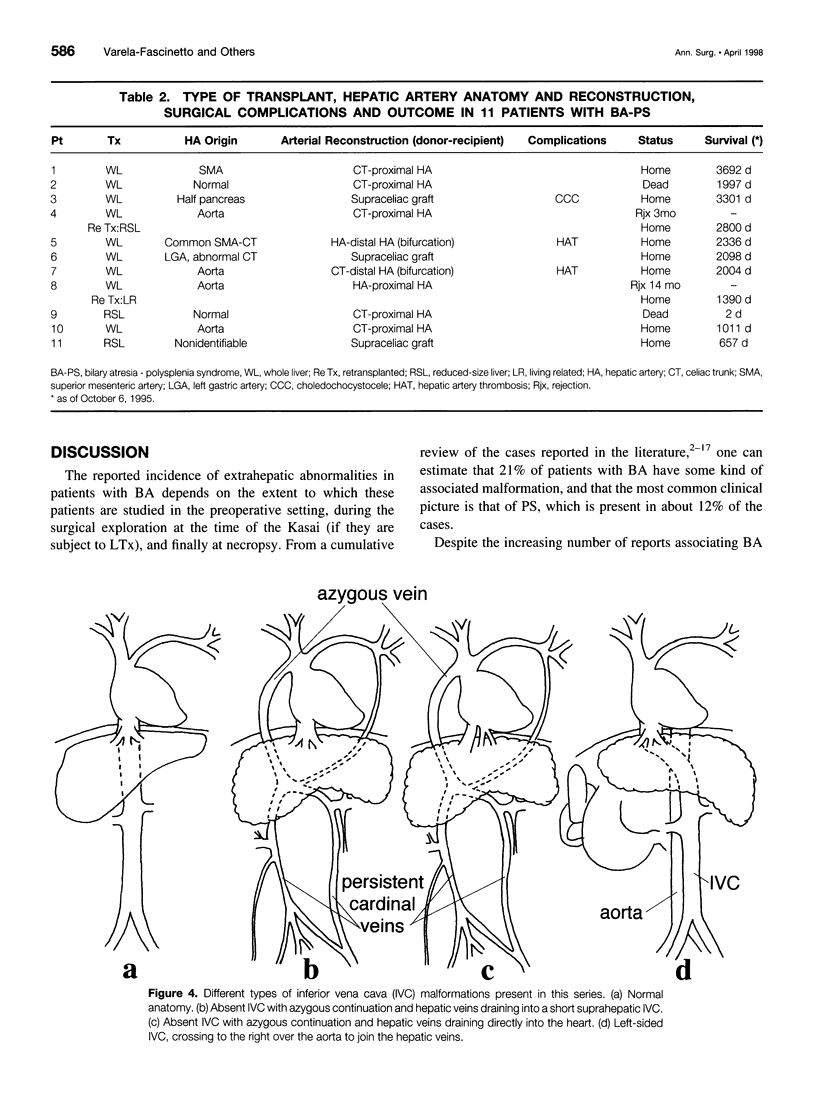
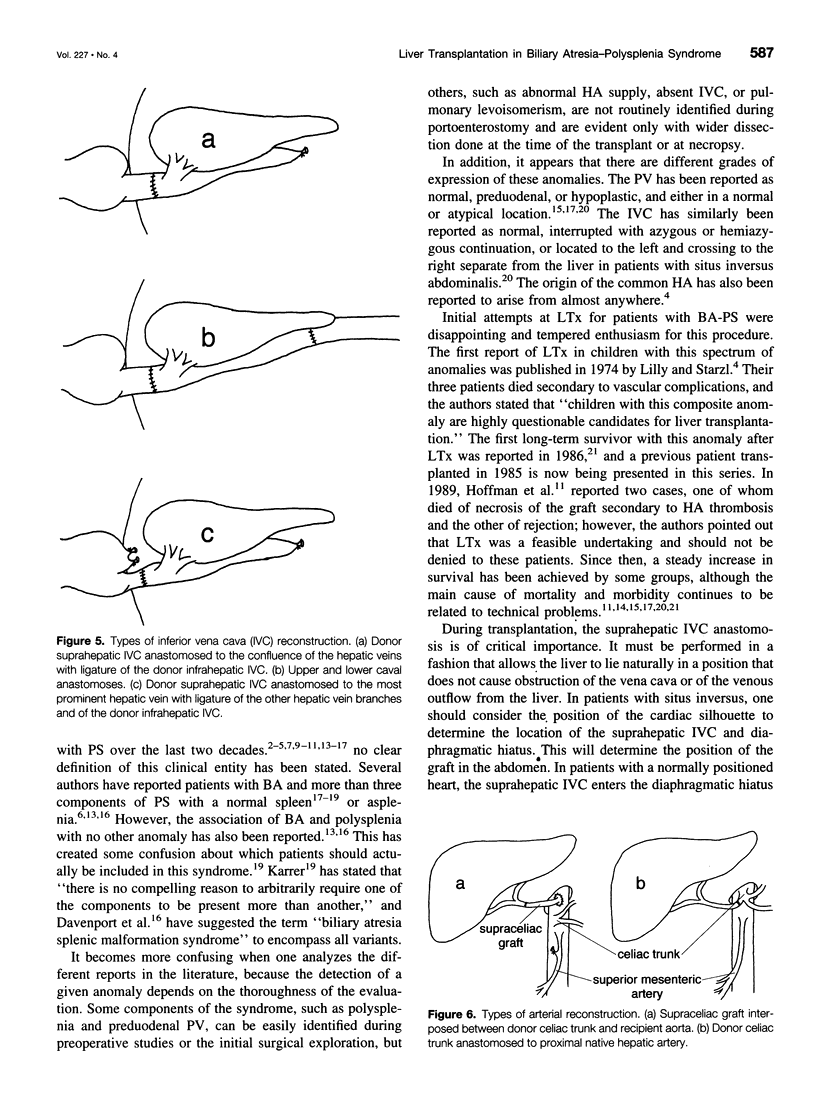
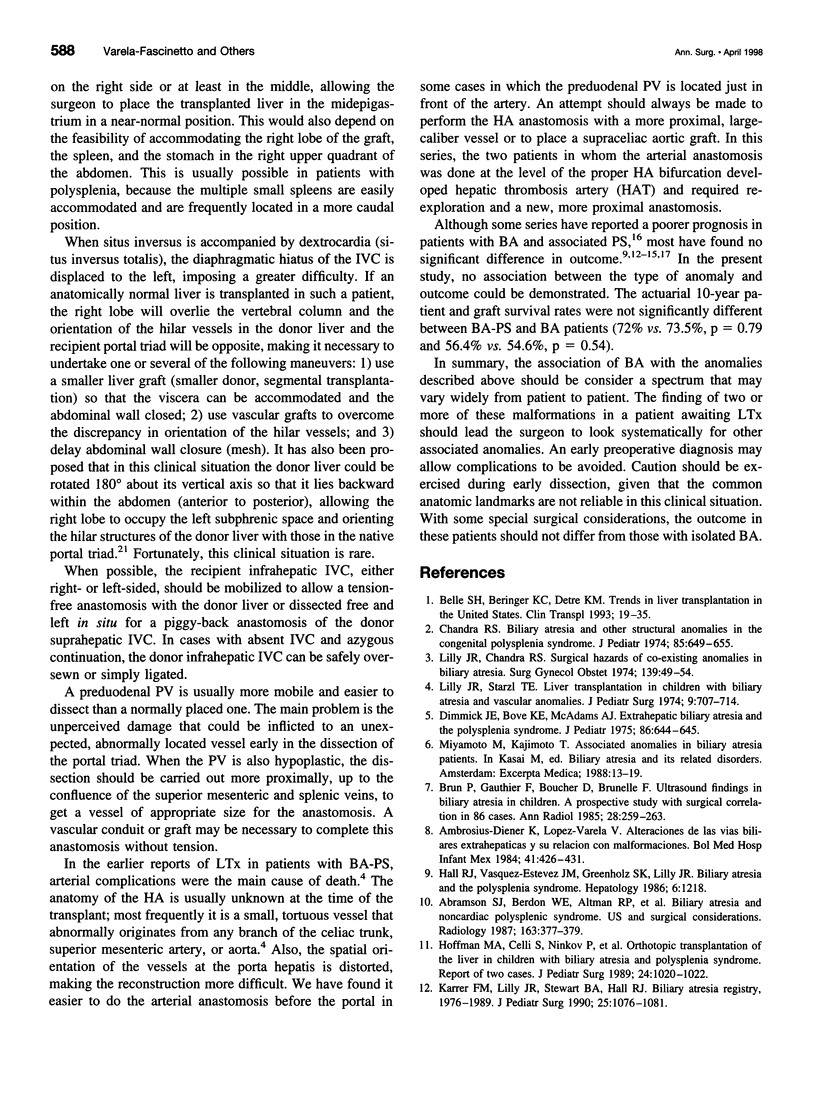

Images in this article
Selected References
These references are in PubMed. This may not be the complete list of references from this article.
- Abramson S. J., Berdon W. E., Altman R. P., Amodio J. B., Levy J. Biliary atresia and noncardiac polysplenic syndrome: US and surgical considerations. Radiology. 1987 May;163(2):377–379. doi: 10.1148/radiology.163.2.3550880. [DOI] [PubMed] [Google Scholar]
- Ambrosius-Diener K., López-Varela V. Alteraciones de las vías biliares extrahepáticas y su relación con malformaciones. Bol Med Hosp Infant Mex. 1984 Aug;41(8):426–431. [PubMed] [Google Scholar]
- Belle S. H., Beringer K. C., Detre K. M. Trends in liver transplantation in the United States. Clin Transpl. 1993:19–35. [PubMed] [Google Scholar]
- Brun P., Gauthier F., Boucher D., Brunelle F. Ultrasound findings in biliary atresia in children. A prospective study with surgical correlation in 86 cases. Ann Radiol (Paris) 1985;28(3-4):259–263. [PubMed] [Google Scholar]
- Chandra R. S. Biliary atresia and other structural anomalies in the congenital polysplenia syndrome. J Pediatr. 1974 Nov;85(5):649–655. doi: 10.1016/s0022-3476(74)80508-1. [DOI] [PubMed] [Google Scholar]
- Davenport M., Howard E. R. Biliary atresia and the polysplenia syndrome. J Pediatr Surg. 1992 Apr;27(4):539–540. doi: 10.1016/0022-3468(92)90362-b. [DOI] [PubMed] [Google Scholar]
- Davenport M., Savage M., Mowat A. P., Howard E. R. Biliary atresia splenic malformation syndrome: an etiologic and prognostic subgroup. Surgery. 1993 Jun;113(6):662–668. [PubMed] [Google Scholar]
- Dimmick J. E., Bove K. E., McAdams A. J. Letter: Extrahepatic biliary atresia and the polysplenia syndrome. J Pediatr. 1975 Apr;86(4):644–645. doi: 10.1016/s0022-3476(75)80185-5. [DOI] [PubMed] [Google Scholar]
- Falchetti D., de Carvalho F. B., Clapuyt P., de Ville de Goyet J., de Hemptinne B., Claus D., Otte J. B. Liver transplantation in children with biliary atresia and polysplenia syndrome. J Pediatr Surg. 1991 May;26(5):528–531. doi: 10.1016/0022-3468(91)90698-s. [DOI] [PubMed] [Google Scholar]
- Hoffman M. A., Celli S., Ninkov P., Rolles K., Calne R. Y. Orthotopic transplantation of the liver in children with biliary atresia and polysplenia syndrome: report of two cases. J Pediatr Surg. 1989 Oct;24(10):1020–1022. doi: 10.1016/s0022-3468(89)80206-4. [DOI] [PubMed] [Google Scholar]
- Karrer F. M., Hall R. J., Lilly J. R. Biliary atresia and the polysplenia syndrome. J Pediatr Surg. 1991 May;26(5):524–527. doi: 10.1016/0022-3468(91)90697-r. [DOI] [PubMed] [Google Scholar]
- Karrer F. M., Lilly J. R., Stewart B. A., Hall R. J. Biliary atresia registry, 1976 to 1989. J Pediatr Surg. 1990 Oct;25(10):1076–1081. doi: 10.1016/0022-3468(90)90222-u. [DOI] [PubMed] [Google Scholar]
- Lilly J. R., Chandra R. S. Surgical hazards of co-existing anomalies in biliary atresia. Surg Gynecol Obstet. 1974 Jul;139(1):49–54. [PubMed] [Google Scholar]
- Lilly J. R., Starzl T. E. Liver transplantation in children with biliary atresia and vascular anomalies. J Pediatr Surg. 1974 Oct;9(5):707–714. doi: 10.1016/0022-3468(74)90109-2. [DOI] [PMC free article] [PubMed] [Google Scholar]
- Moller J. H., Nakib A., Anderson R. C., Edwards J. E. Congenital cardiac disease associated with polysplenia. A developmental complex of bilateral "left-sidedness". Circulation. 1967 Nov;36(5):789–799. doi: 10.1161/01.cir.36.5.789. [DOI] [PubMed] [Google Scholar]
- Raynor S. C., Wood R. P., Spanta A. D., Shaw B. W., Jr Liver transplantation in a patient with abdominal situs inversus. Transplantation. 1988 Mar;45(3):661–663. doi: 10.1097/00007890-198803000-00034. [DOI] [PubMed] [Google Scholar]
- Silveira T. R., Salzano F. M., Howard E. R., Mowat A. P. Congenital structural abnormalities in biliary atresia: evidence for etiopathogenic heterogeneity and therapeutic implications. Acta Paediatr Scand. 1991 Dec;80(12):1192–1199. doi: 10.1111/j.1651-2227.1991.tb11808.x. [DOI] [PubMed] [Google Scholar]
- Vazquez J., López Gutierrez J. C., Gámez M., López-Santamaría M., Murcia J., Larrauri J., Diaz M. C., Jara P., Tovar J. A. Biliary atresia and the polysplenia syndrome: its impact on final outcome. J Pediatr Surg. 1995 Mar;30(3):485–487. doi: 10.1016/0022-3468(95)90062-4. [DOI] [PubMed] [Google Scholar]
- Watson C. J., Rasmussen A., Jamieson N. V., Friend P. J., Johnston P. S., Barnes N. D., Calne R. Y. Liver transplantation in patients with situs inversus. Br J Surg. 1995 Feb;82(2):242–245. doi: 10.1002/bjs.1800820236. [DOI] [PubMed] [Google Scholar]



